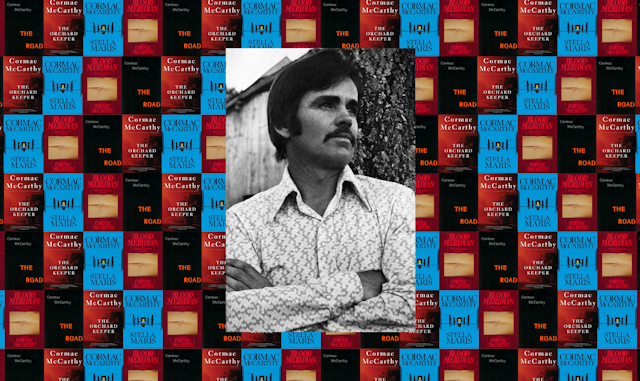Endings, extinctions, last things preoccupied Cormac McCarthy from the start to the recent close of his 60-year career as a writer of fiction and, occasionally, drama for stage or screen. His first novel, The Orchard Keeper (1965), ends with the word “dust”. His final novel, Stella Maris (2022), allows only the briefest interval before an equivalent termination, finishing with the central character saying she is “waiting for the end of something”.
It is not only in The Road (2006), where environmental devastation has followed “a shear of light and a series of long concussions”, that McCarthy’s reader finds apocalypse. All of his novels, from the early quartet in southern gothic style, through the mid-career westerns, to the last diptych of The Passenger (2022) and Stella Maris, show a drive towards the ruined and the depleted.
All the Pretty Horses (1992), for example, offers in generous measure the satisfactions of the western: laconic dialogue and male camaraderie, say, or feats of equestrian skill. Yet the novel imagines the US-Mexico borderlands as “cauterized terrain” or “tenantless waste”, inhabited by “the dead standing about in their bones”.
Blood Meridian (1985), McCarthy’s hallucinatory novel about violent American scalp-hunters in Mexico in the 1840s, speaks of “the awful darkness inside the world”. Still more bleakly, The Road proposes “darkness implacable”.
“Darkness implacable” is very adjacent to the “darkness visible” of John Milton’s Paradise Lost. The textual echo is unsurprising, for two reasons.
First, though McCarthy was the most materially sensitive of writers (attending minutely to the gait of an injured dog or the splash of a boot in water), he was also one of the most bookish (travelling through the fiction of Herman Melville and William Faulkner, as well as through the landscapes he wrote about). And second, in McCarthy, as in Milton, paradise is lost.
McCarthy’s style
Why are some of us so drawn to McCarthy’s cartography of devastation?
An answer of sorts might begin by expanding on that last moment in Stella Maris, when the mentally unwell protagonist tells her therapist she wants him to hold her hand “because that’s what people do when they’re waiting for the end of something”.
McCarthy’s fiction does not exactly hold out a comforting hand in the face of ruin. His fiction chafes against any expectation that it be consoling or therapeutic. But, nevertheless, reading his work can give an exhilarating sense of counter-forces to offset the deathly. (Like experiencing the fiction and drama of Samuel Beckett, perhaps – but with more horses.)

Always, with McCarthy, there are the sentences themselves. His style is not for everyone. Will Self told The Guardian in 2011 that he found McCarthy “to be a writer easily parodied”.
And, yes, you can imagine getting drunk in a McCarthy drinking game that requires players to have a shot each time they encounter in the fiction a fragment of untranslated Spanish, or a comparison with pilgrims or mendicants, or an arcane word such as “cottered” or “cantle” or “sleavings”.
But for McCarthy’s enthusiasts, the prose is expressive of creativity and animation. Take just this sentence from All the Pretty Horses:
He crossed a dry gypsum playa where the salt crust stove under the horse’s hooves like trodden isinglass.
We’ll come in a moment to the topographical precision, but first there is the acoustic payoff, the reward for our ears, of “salt crust stove” and “trodden isinglass”.
Care is needed here. In Literary Theory, Terry Eagleton has fun with the tradition in English literary criticism that wants words to be just as concrete as things: “the best poem, to caricature the case a little, was one which read aloud sounded rather like chewing an apple”.
Nevertheless, such caution should not deter us from the pleasure of hearing McCarthy’s sentences. And of seeing them, too, as they shift in the same novel from baroque accumulations to compressed formations.
Words and landscapes
The sentence from All the Pretty Horses may be crunchy, but it also displays McCarthy’s remarkable sensitivity across his fiction to the particularities of place. Here writer Robert Macfarlane’s book Landmarks is helpful.
“Words are grained into our landscapes,” he says, “and landscapes grained into our words.” And Macfarlane adds, with regard to authors he discusses: “All have written with committing intensity about their chosen territory.”
McCarthy is thoroughly in this tradition: a writer passionately committed to his preferred landscapes. He brings descriptive abundance even to terrains that seem to the casual glance thin or empty.
Think, for example, of New Mexico’s high country in The Crossing (1994), or Nebraska in The Passenger, where the Platte river is “threading the sandbars in the deep burgundy dusk”.
The politics of McCarthy’s fiction is legitimately open to question. For its Anglocentric modelling of Mexico, say, or its stubborn attachment to the white American male. But it is a valuable resource in our current moment of ecocide, alerting us to topographical distinction and to species variation.
Near the end of The Crossing, a character reflects: “It sounds like death is the truth”. Undeniably, death was the truth, the profound subject, in McCarthy’s fiction.
Yet that never meant it had the last word. There was always a new McCarthy sentence, a new McCarthy novel to anticipate. That is no longer the case. Yet this means there is now much rereading for us to do.

